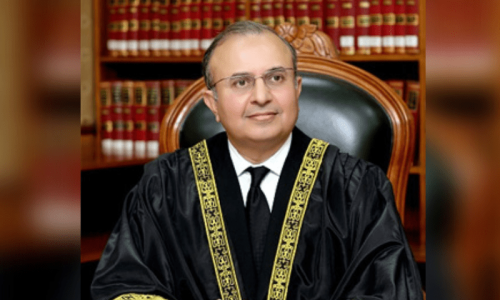WASHINGTON: The US administration — encouraged by the ongoing operation in Fata — has informed Congress that Pakistan is now targeting both Afghan and Pakistani Taliban.
The assessment, given at a congressional hearing, differs drastically from an earlier Pentagon report, which said that Pakistan was only targeting TTP, while allowing the Haqqanis to escape.
But at the latest congressional hearing on Afghanistan and Pakistan, US Principal Deputy Special Representative Jarrett Blanc said “the operations have disrupted militant activities in the tribal areas and resulted in seizures of weapons caches and significant quantities of IED materials.”
He identified the groups affected by these operations as those who “had been using the area to plan and launch attacks into Afghanistan and within Pakistan.On Wednesday, a two-day meeting of the US-Pakistan Defence Consultative Group, which ended with a US affirmation that the North Waziristan operation has disrupted militants.
But Mr Blanc, who works for the office of the US Special Representative for Pakistan and Afghanistan, went a step ahead of the joint statement and assured US lawmakers that the Zarb-e-Azb operation was a part of a greater effort to defeat terrorists.
“The operation is the latest phase of Pakistan’s efforts to extend greater government control in Fata, beginning with Bajaur Agency in 2008 and is the most extensive of the Fata operations conducted to date,” he said.
Mr Blanc said the assistance the United States provided to Pakistan had also helped the country in carrying out the military operation in North Waziristan.
He underlined the need to continue the operation, noting that the Pakistani Taliban and Afghan Taliban continued to pose a threat to Pakistan, its neighbours and to the United States.
“As such, it is vital that the operation continues and that every effort is made not just to disrupt safe havens and militant networks, but to prevent them from being re- established in the tribal areas and from operating elsewhere in Pakistan,” he said.
When lawmakers pointed to media reports that Pakistan had allowed some militants to leave North Waziristan, Mr Blanc said: “Pakistani leaders have told us that they are targeting all militant groups, including the Haqqani network, and we will hold them to these commitments.”
The United States, he said, has been very clear with the Pakistani leadership about the need to prevent the re-establishment of Haqqani safe havens. “And Pakistani leaders have said publicly that they will not allow this to happen.”
The US official noted that many in Pakistan had been surprised by what they discovered in Miramshah and Mirali: networks, tunnels, IED factories and munitions. “These discoveries underscore the risks of safe havens on either side of the Afghanistan- Pakistan border,” he said.
“Even the most sceptical among us have to acknowledge that it has disrupted operations emanating from the North Waziristan agency, especially for the Pakistani Taliban,” said key congressman Ted Deutch.
“I’ve been encouraged by Pakistan’s military operations in North Waziristan.”Congressman Deutch also noted that “progress has been made in disrupting the Haqqani network’s operations in the tribal areas” but reminded Pakistan it could not rid itself of terrorism “without going after terrorists wholesale.”
“And despite the mistrust and tensions, we need cooperation from Pakistani security services, as well as strong communication with Pakistan’s civilian leadership,” he said.
However lawmaker, Congresswoman Ilena Ros-Lehtinen, had reservations about Pakistan’s commitment to fight terrorists.
“Pakistan continues to harbour and host insurgents and other extremists in the Afghan border regions,” she claimed.
“Making matters worse, Pakistan’s intelligence service is known to cooperate with the Taliban as it works to undermine Afghanistan’s stability,” she said.
“Even more concerning, Pakistan’s nuclear weapons stockpile is reportedly growing faster than any other in the world and is notoriously insecure.” Mr Blanc told the lawmakers the US-Pakistan relationship was full of both opportunity and challenges.
“But the bottom line is that our relationship is vital to the national security of the United States,” he said. “A stable, prosperous Pakistan that plays a constructive role in the region is in both our countries’ interests, and has an acute effect on the region.”
Published in Dawn, December 12th, 2014









































Dear visitor, the comments section is undergoing an overhaul and will return soon.